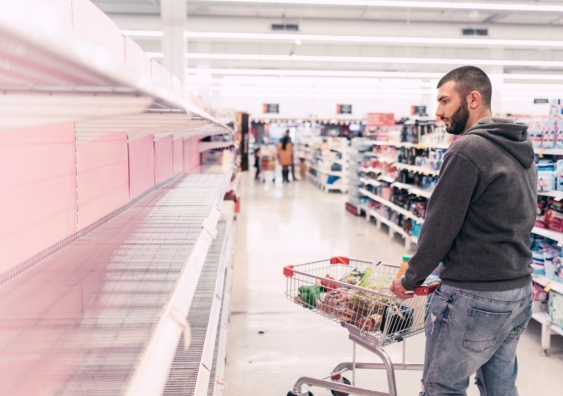Panic buying strikes again over fears of a second wave
Panic buying toilet paper is a quick mental fix that makes people feel more prepared and less anxious, says a UNSW consumer behaviour expert.
Panic buying toilet paper is a quick mental fix that makes people feel more prepared and less anxious, says a UNSW consumer behaviour expert.

Panic buying toilet paper seems to be as highly infectious as the virus itself. A spike in COVID-19 hotspots in Victoria has prompted thousands of Australians to rush back to stores to stockpile essentials.
“When at risk, people feel reassured when they are able to take back a sense of control and do something to reduce that risk,” says Associate Professor of Marketing Nitika Garg from UNSW Business School.
Consumers are also panic buying out of the fear of the unknown.
“They do not know if supplies of essential goods will be ongoing or disrupted and are therefore buying supplies in bulk in case they need to self-isolate. People are also stocking up fearing that they might be trapped in a similar situation to Wuhan where everyone is in lockdown,” says A/Prof. Garg.
The daily necessities of the average Australian have evolved to include what makes our lives comfortable and convenient – and toilet paper seems to be clearly one of them.
To ensure fair distribution, shopping limits have been reintroduced by supermarkets in Victoria and it might be the case that NSW needs to follow suit.
A/Prof. Garg’s research on the influence of emotions on consumer judgment and decision-making has identified this panic buying behaviour to be irrational and out of the norm.
“In times of stress, emotions are heightened, and consumers feel more pressured to buy on the spot when they see something that is high in demand becoming scarcer,” she says.
This explains why viral videos of empty shelves have prompted many people to follow the crowd to the toilet paper aisle.
“The fact that people can incubate the virus and only show symptoms up to 14 days later has driven many people to prepare for the worst and stockpile supplies in fears of a second wave of COVID-19. They are currently in survival mode.”
Research has indicated that people on average use 100 toilet paper rolls in a year – which comes down to three or four rolls per person over the 14-day self-isolation period.
“Toilet paper shortage should therefore not be a cause for concern as people will not be homebound for months on end if the need to self-isolate arises,” A/Prof. Garg says.
At the start of the pandemic, Woolworths Group CEO Brad Banducci released a statement confirming that the main suppliers of toilet paper – namely Kleenex, Sorbent and Quilton – are all based locally with factories in South Australia, NSW, Victoria, Queensland and Western Australia.
So, a disruption in the supply chain is unlikely to be affected by closed borders.
“Most major supermarkets have a contingency plan that they can activate in the event of a pandemic,” A/Prof. Garg says.
To remind people that toilet paper is locally produced, A/Prof. Garg suggests that retailers can put a sign at the point of purchase to educate consumers about the manufacturing process.
“This will inform customers that products are being manufactured locally so there is no need to buy months’ worth of supplies.”
Fear-driven buying is real. However, it only occurs in the short-term.
“When people are panic buying, they are not thinking rationally or clearly. In the long run, they would try to remove themselves as far away as possible from anything that is remotely related to a negative association.
“For example, some people have stopped drinking Corona beers and others have stopped going to Chinese restaurants in Australia over fears that coronavirus will be transmitted through the food. People are shying away from China and this has impacted the overall economy.”
“We don’t expect to see big supermarkets implementing fear-based tactics and profit from people panic buying as this will definitely hurt their brand image,” A/Prof. Garg says.
While some individuals are upselling toilet paper on the internet for up to $1000 a pack, she reassures that supermarkets will not be increasing their prices.
“Fear tactics have never made the consumer loyal due to its unethical practice.”
Rather than profiteering out of the unusual situation, many online retailers such as eBay and Amazon have been hard at work removing deceitful listings selling toilet paper at exorbitant prices.
“You want people to have positive associations with your brand, and fear-induced behaviour is not sustainable. It has been proven that it is only effective in the short-term,” she says.
“People will choose to avoid such brands once the pandemic is over as they don’t want to have to think about the negative associations that they’ve made with COVID-19.”